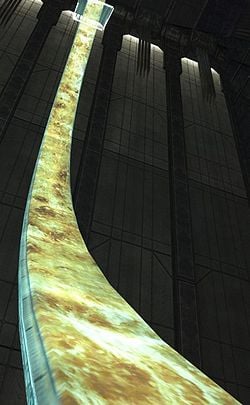Installation 07: Difference between revisions
From Halopedia, the Halo wiki
m (→List of appearances: Not mentioned only, the entire story of the book is set on Installation 07.) |
|||
| Line 57: | Line 57: | ||
**''[[Origins]]'' | **''[[Origins]]'' | ||
*''[[The Forerunner Saga]]'' | *''[[The Forerunner Saga]]'' | ||
**''[[Halo: Primordium]]'' | |||
**''[[Halo: Primordium]]'' | |||
==Sources== | ==Sources== | ||
Revision as of 14:11, April 2, 2012
| Installation 07 | |
|---|---|

| |
| General overview | |
|
Description: |
Desert-like landscape[1] |
|
Location: |
Within the Milky Way |
| Operation overview | |
|
Type: |
|
|
Function: |
Galactic sterilization/Flood containment and research |
|
Date of construction: |
Before c. 100,000 BCE |
|
Status: |
Deactivated from Installation 00 as of December 2552 |
| Structural information | |
|
Diameter: |
10,000 kilometers (formerly 30,000 kilometers)[2] |
Installation 07, also known as Zeta Halo[3], is one of the seven Halo installations that survived Mendicant Bias' assault on the Forerunner capital.
Background
Forerunner-Flood war
Unlike most of the rings in the final Halo Array, Installation 07 was manufactured at the greater Ark instead of Installation 00 or the "lesser Ark". As a result, it was originally three times the size of a normal Halo ring (30,000 kilometers in diameter).[2] During the Forerunner-Flood war, the ring was placed under control of the AI Mendicant Bias by the Master Builder.
Circa 100,043 BCE, the installation was test-fired near Charum Hakkor. As an unprecendented side-effect of this firing, the Timeless One, an ancient entity that had been imprisoned on the planet for millennia, was released from its cage and was subsequently taken to the ring for study. Over a period of 43 years, Mendicant Bias interrogated the Captive, which eventually convinced the AI to go rampant and turn against its masters.
Using the ring, Mendicant Bias attacked the Forerunner capital, but as the installation took heavy damage, it retreated into a distant system through a slipspace portal. Later, the installation was damaged even more when it barely evaded collision with a planet. After being recaptured by the Didact's forces, the ring discarded two-thirds of its mostly damaged structure, contracting to the diameter of 10,000 kilometers in order to allow it to perform a successful slipspace jump to the greater Ark.[4] It was later made one of the rings in the final Halo Array as it was distributed across the galaxy.[5]
 This section needs expansion. You can help Halopedia by expanding it.
This section needs expansion. You can help Halopedia by expanding it.
Activation
On November 3, 2552, during the Battle of Installation 05, a signal was sent to this Halo from Installation 05, putting the former - as well as the entire array - on standby mode. Installation 07 was then ready to fire on demand.[6]
Deactivation and later history
Later the same year, during the Battle of Installation 00, Installation 00 was still on standby. However, SPARTAN John-117 deactivated the Halo Array before it could be fired, rendering Installation 07 inert.[7]
Through unknown means, the Office of Naval Intelligence later managed to perform a cursory examination of Installation 07, discovering its size and deducing that its surface was overrun by a perpetual cloud cover, although information on the ring remained sparse. The cloud-covered surface led an ONI scientist to speculate on whether the ring's life support systems had never recovered from the damage it sustained 100,000 years prior.[2]
Trivia
The installation surface resembles Venus's surface.
Gallery
- 1211311398 Installation 01.jpg
The symbol representing Installation 07.
List of appearances
- Halo 2 (First appearance) (Holographic representation)
- Halo 3 (Holographic representation)
- Halo: Combat Evolved Anniversary (Terminals only)
- The Forerunner Saga
- Halo: Cryptum (Mentioned only)
- Halo: Primordium
- Halo: Legends
- The Forerunner Saga
Sources
- ^ Halo Encyclopedia, page 174
- ^ a b c Halo: Primordium page 341
- ^ Halo 3 Texture files: halo_inner_ring
- ^ Halo: Primordium, page 344
- ^ Halo: Primordium, page 374
- ^ Halo 2, campaign level The Great Journey
- ^ Halo 3, campaign level The Covenant
